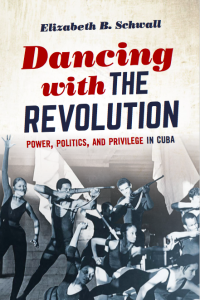Contact Professor Schwall
Office
Liberal Arts (18), Room 313Dr. Elizabeth Schwall (she/her)
About Me:
 I am an interdisciplinary historian of twentieth-century Latin America and the Caribbean. My research sits at the intersection of history and dance studies as I seek to better understand the physical movements that animated everyday politics and social relations.
I am an interdisciplinary historian of twentieth-century Latin America and the Caribbean. My research sits at the intersection of history and dance studies as I seek to better understand the physical movements that animated everyday politics and social relations.
What have you been up to lately? Accordion Closed

My first book, Dancing with the Revolution: Power, Politics, and Privilege in Cuba (University of North Carolina Press, 2021), examines how Cuban dancers engaged with the state and revolutionary politics from 1930 to 1990. Drawing on written and visual archives, including previously unexamined exchanges between dancers and bureaucrats, I argue that Cuban dancers used their bodies and ephemeral, nonverbal choreography to support and critique political regimes and cultural biases. While generally promoting revolutionary projects like mass education and internationalist solidarity, dancers also took risks by challenging racial prejudice, gender norms, and censorship, all of which could affect dancers personally. On a broader level, I show that dance, too often overlooked in histories of Latin America and the Caribbean, provides fresh perspectives on what it means for people, and nations, to move through the world.
What’s are you working on next? Accordion Closed
My new book project turns from professional dancers in Cuba to environmental activists in Brazil to understand how people used their bodies and movements in political projects to save the world. More specifically, I examine protests, performances, and moments of political theater in the lead up to, and on display during, the United Nations Conference on Environment and Development in Rio de Janeiro, Brazil, which unfolded over the course of two weeks in June 1992. The Rio Earth Summit, as it became known, involved between 35-50,000 people from 178 countries, including more than 100 world leaders and 10,000 journalists, attending the official UN conference and parallel Global Forum for non-governmental organizations and concerned citizens. This global mega-event evidenced a longer history of performative environmental justice struggles in Brazil, which helped bring the conference to Rio. Tentatively titled, Rio Earth Summit: A History in Motion, this interdisciplinary microhistory seeks to rethink global environmental justice struggles with bodies and Brazil at the center.